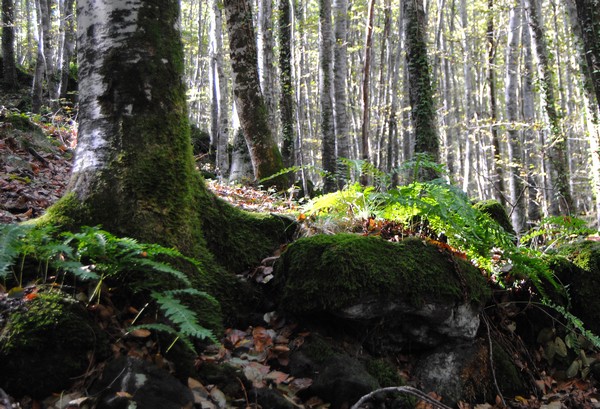
The rustling of leaves in the wind, the babble of the brook, the crackling of a branch... the forest murmurs are unsettling when we're on alert, but they seem part of an intimate conversation between the forest and us when our mind is at peace and we feel in harmony with our environment; The feeling roughly describes roughly what in German is known as Waldeinsamkeit. Today we're listening to Geheimes Flüstern hier und dort, a Lied by Clara Schumann that tells about this feeling of communion with nature.
Clara Schumann was more a performer than a composer; She toured greatly and gave a large number of concerts for more than sixty years throughout the continent and the UK, and the reviews used to describe her as the greatest pianist of her time, except for, perhaps, Franz Liszt, who, incidentally, admired her enormously (and made some transcriptions of her Lieder, among them, Geheimes Flüstern hier und dort). Undoubtedly, she was one of the most important musical personalities of the 19th century. As a composer, she didn't leave many works: twenty-one published and a handful of unpublished. Some of them, mostly solo piano, were written during her time as a wunderkind, under his father's tutelage. Friedrich Wieck trained an awesome musician. He didn't educate her as was expected. Not only he taught her to play the piano as a male pianist, but also did something absolutely unusual at that time, considered absurd and indeed questionable: teaching the girl composition. She didn't waste her lessons; If you haven’t done it already, listen, for example, to her opus 7, the amazing piano concert that she wrote when she was around fifteen.
In those first years, she mostly wrote virtuoso pieces that she used to play in her concerts; most of her songs were written during those years she was married to Robert. I suggest listening today to a song from the opus 23, Sechs Lieder aus "Jucunde", her last one (opus 18 and 19 don't exist); She finished the cycle in June 1853, a few months before Robert tried to commit suicide and was committed to an asylum where he remained until his death. Once a widow, Clara hardly composed anything except for transcriptions or arrangements from works by her late husband.
The six lieder of this cycle are upon poems included in a novel called Jucunde, which was at the Schumanns' home before it was published. This time, there wasn’t a previous relationship with the poet; it seems that the editor sent the book. Not a bad idea; the book could get promoted through Robert Schumann's songs if it were the case. I just hope that Hermann Rollet, the writer, didn't feel disappointed when got a letter from Robert in response to his, thanking him for his lieder; He explained that indeed there was a "Schumann's cycle" with his poems, but the composer wasn't himself but Clara.
Hermann Rollet, born in 1819 in Baden, near Vienna, was a writer and journalist, a high-risk profession at the Metternich era for someone openly in favour of press freedom, as he was. So risky that he had to flee from Austria after publishing in 1845 his second poetry collection Frühlingsboten aus Österreich. This title seems to be harmless, when we talk about spring messengers we usually think of snowdrops or daffodils, but something should have been in those poems that the regime didn't like at all. Rollet lived in different places in Germany during the first years of exile, trying to go unnoticed, but he finally took refuge in a safer place, Switzerland, from where he returned in 1854. A few years later, the composer and the poet met in person during a Clara’s visit in Vienna, and they might have talked about the misunderstanding on the authorship of the song cycle from Jucunde.
Geheimes Flüstern hier und dort is the third song of the cycle. The poem had originally four verses, but Clara Schumann got rid of the second, precisely where the Waldensaimkeit is mentioned, and moved the third one to the beginning. I don't know why she did so, but the soft, secret whispers that open the song already show the intimacy between the forest and the poetic voice, while maintaining some mystery about what's happening there. In addition to suppressing a stanza, Clara Schumann made a couple of changes; for instance, she replaced the original Liebe [love] with Leben [life] in the first stanza. Why would she do it?
This is a pure strophic song, except for the short postlude; please pay attention to how Wolfgang Holzmair (accompanied by Imogen Cooper) differentiate between the three verses with the nuances of his voice. I hope you like this Lied as much as I do; I also hope that we will all be celebrating, this week, Clara Schumman 200th anniversary; Friday is THE day. Thank you for your music, Clara!
Geheimes Flüstern hier und dort,
Verborg’nes Quellenrauschen,
O Wald, o Wald, geweihter Ort,
Laß mich des Lebens reinstes Wort,
in Zweig und Blatt belauschen!
Und schreit’ ich in den Wald hinaus,
Da grüßen mich die Bäume,
Du liebes, freies Gotteshaus,
Du schließest mich mit Sturmgebraus
In deine kühlen Räume!
Was leise mich umschwebt, umklingt,
Ich will es treu bewahren,
Und was mir tief zum Herzen dringt,
Will ich, vom Geist der Lieb’ beschwingt,
In Liedern offenbaren!